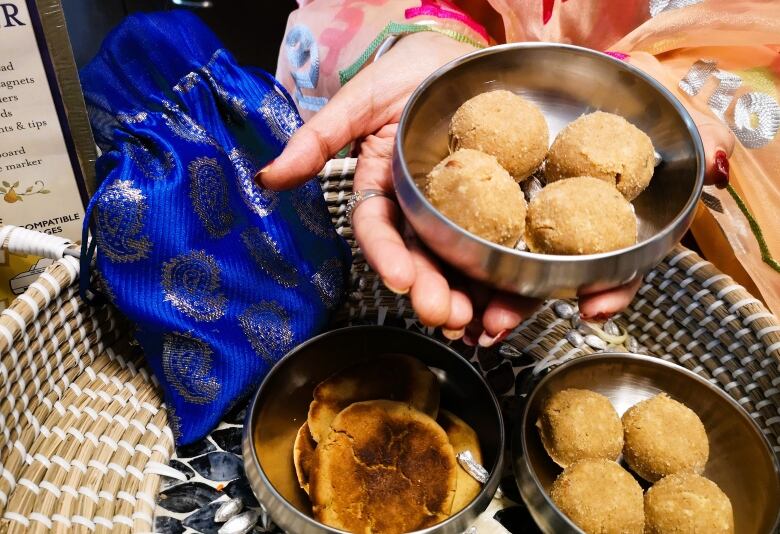Keeping Sikh recipes and legacies alive through food: Andrew Coppolino
Local chef collects recipes, stories from Sikh community to create Punjabi recipe book

With the death of her sister-in-law Barinder Kaur, chef and culinary instructor Jasjit Kaur lost not only a family member, but also many of her recipes, her food knowledge and a part of the family's cooking culture.
"I lost someone close to me and thought she would be around so I could get her recipes. I also lost my mom when I was five and just have the stories of her cooking but no documented recipes. If I had these recipes, I would consider myself the richest person of all," says Kaur, a Cambridge, Ont., resident.
The realization has led her to start collecting recipes from the local Punjabi community with the plan to create a cookbook.
"Recipes carry memories and have stories behind them, so why not capture that? Food is a central part of life, of our communities," she says.
Kaur chose April 14, the auspicious date of Vaisakhi, to launch her project. The northern Indian holiday celebrates the bounty of the spring harvest and is a key date in the founding of Sikhism. In many parts of India, it is celebrated as the solar new year as well.

Holding memories of loved ones through traditional recipes
While she recognizes the lost opportunity to record an oral recipe tradition when a family cook dies, Kaur also points to a larger trend when it comes to cooking in general, which has also inspired the project.
"There's more fast food, I feel. Fewer people cook these days, and it takes time to make traditional recipes," she says. "But I believe we will make the time when we have the recipe close by and we say, 'okay, this is my mother's recipe or my grandmother's.' You'll be holding the memories — the love — in your hand."
Recipes across all cultures are a snapshot of history, culinary eras, economics, gender identity and social values, but they are also living documents that change and evolve over a cook's lifetime and over the decades and generations.
Cooks will often change or alter a recipe to suit their needs or adjust seasonings and ingredients as tastes change — details that invariably are lost if they are not written down.
Her sister-in-law's recipe for traditional pinnis (see below) is a popular sweet, especially in northern India, with ingredients that include wheat flour, ghee and jaggery. It's one of the recipes that Kaur was able to replicate and now document.

"I like to make dozens of pinnis from this recipe and share them with family and friends. That's traditional," she says. "Each Punjabi home will make their own version, but this is an homage to Barinder."
Kaur is currently reaching out to the Punjabi community — and beyond — to document recipes and, if possible, collect submitted videos of the cooks for social media and a digital cookbook.
She hopes to collect dozens of recipes which she will test and edit for uniformity of presentation before cataloguing them in the community cookbook. That includes any traditional cooking implements and equipment that the cook may have used.
Kaur says she hopes to get traditional recipes that aren't too complicated or time consuming to make and that have accessible ingredients, but she adds that she will include variations.
"I have a few recipes from people who I don't know but I feel that I do now with their stories."
While she's taking the lead with collecting recipes that are an important part of Punjabi culture, Kaur hopes it may inspire others to do the same with their families in what she describes as a "message" she's sending to people of all heritages in our multicultural society.
"I want to save as many of these traditional recipes as possible. This captures the recipes and stories and documents them. The kids, the next generation, will pick up the collection one day and be thankful we left this legacy for them."
If you have a Punjabi recipe and story that you would like to share, contact Jasjit Kaur at kitchenpunjabi@hotmail.com.
Barinder Kaur's pinni recipe as documented by Jasjit Kaur
Yield: 50+ pinnis

Ingredients
375 grams wheat flour
250 grams besan or gram flour
250 grams powdered sugar
62 grams granulated sugar
125 grams jaggery or cane sugar
375 grams warm ghee
62 grams powdered almonds
50 grams roasted and ground flax seeds
25 grams roasted makhana (lotus seeds)
12 grams ginger powder
1 teaspoon ajwain (carom seeds)
Method
Carefully toast the wheat flour and besan separately on low heat for about 15 minutes or until they are no longer raw. In a large mixing bowl. While the flour and ghee are still warm, mix all the ingredients together to incorporate them. Shape the mixture into pinni balls of about 30 grams each.

